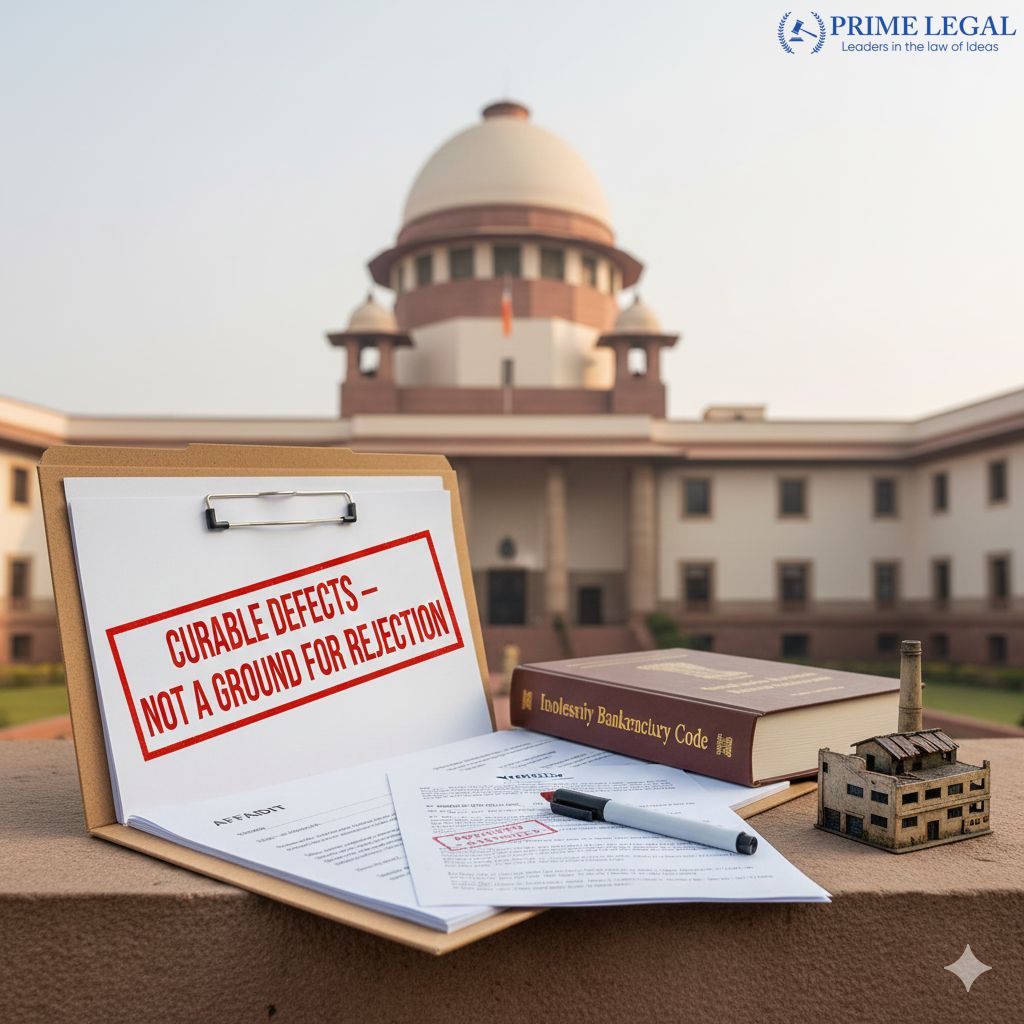CASE NAME: Livein Aqua Solutions Private Limited v. HDFC Bank Limited
CASE NUMBER : Civil Appeal No. 11766 of 2025
COURT: Supreme Court of India
DATE : 24 November 2025
QUORUM: Justice Sanjay Kumar and Justice Alok Aradhe
FACTS
The appellant company availed a loan facility from the respondent-bank to the tune of ₹5.5 crores and the same came to be classified as a non-performing asset on 04.08.2019. Consequently, the respondent-bank filed an application under Section 7 of the IBC, 2016. But the supporting affidavit was sworn nine days earlier, creating a mismatch that the NCLT treated as fatal. The scrutiny section of the NCLT conveyed the defects/objections in the filing of the application of the respondent-bank, but as the same were not removed/rectified, the Joint Registrar of the NCLT refused to register the application, vide order dated 18.10.2023.
Aggrieved by the said order, the respondent-bank filed Appeal No. 4 of 2024 under Rule 63 of the NCLT Rules. The respondent-bank’s appeal was allowed by the NCLT on 08.02.2024. However, even after that opportunity, defects remained unrectified, and the NCLT rejected the application on 08.06.2024. Aggrieved by the rejection of its application under the order dated 18.06.2024, the respondent-bank filed an appeal before the NCLAT. The NCLAT set aside that rejection, holding that the defect was curable, and remanded the matter for decision on merits without requiring the bank to cure the defective affidavit. Aggrieved by this order, the appellant company is in appeal before us.
ISSUES
- Whether the application under Section 7 of IBC 2016 supported by a defective affidavit can be rejected at the threshold.
- Whether the NCLAT erred in restoring the petition for merits-based adjudication without directing the respondent-bank to cure the defect.
LEGAL PROVISIONS
- Section 7 of Insolvency and Bankruptcy Code, 2016 allows a financial creditor to initiate the Corporate Insolvency Resolution Process (CIRP) when a corporate debtor has defaulted on a financial debt.
The proviso to Section 7(5)(b) obliges the adjudicating authority to give notice to an applicant. - Rule 34(4), NCLT Rules, 2016 provides that every petition/application before the NCLT must be verified by an affidavit in Form NCLT-6.
ARGUMENTS
APPELLANT:
The counsel for the appellant contended that the defective affidavit filed in support of the respondent-bank’s application under Section 7 of the IBC was sufficient to hold the application itself liable to be rejected on the ground of being non est. Further it was contended that the defects were not removed despite multiple opportunities and NCLAT erred in restoring the petition without ensuring rectification of the affidavit.
RESPONDENT:
The counsel for the respondent contended that the defect in the affidavit was only procedural and curable by filing of a better affidavit in support of the application. A defective affidavit does not per se invalidate a Section 7 application altogether. Further it was also contended that the NCLT failed to issue a notice to the respondent which is mandatory under the proviso to Section 7(5)(b)
ANALYSIS
The Supreme Court observed that procedural defects in a Section 7 insolvency application under IBC, such as a defective affidavit, are curable and cannot be used as a basis for summary dismissal. Mere filing of a ‘defective’ affidavit in support of an application would, however, not render the very application non est and liable to be rejected on that ground as it is neither an incurable nor a fundamental defect.
Further, the Court observed that no notice was given to the respondent-bank under the proviso to Section 7(5)(b) of the IBC except for a consolidated notice issued by the Joint Registrar of the NCLT in relation to 26 petitions/applications. The Supreme Court by referring to its previous precedents in Dena Bank vs. C. Shivakumar Reddy and another, (2021) 10 SCC 330, Uday Shankar Triyar vs. Ram Kalewar Prasad Singh and another, (2006) 1 SCC 75 where it was held that non-compliance with any procedural requirement relating to an application should not entail automatic dismissal or rejection, unless the relevant statute or rule so mandates, and procedural defects and irregularities which are curable should not be allowed to defeat substantive rights or to cause injustice.
However the Court was not convinced by the NCLAT’s decision to direct the NCLT to hear the Respondent’s case on merits, without directing the Respondent to cure the defect. It was observed that the NCLAT ought to have asked the respondent-bank to cure the defective affidavit at least at that stage instead of ignoring the same and directing the NCLT to proceed to hear the company petition on merits and in accordance with law. To that extent, the NCLAT was in error
JUDGEMENT
The Supreme Court disposed of the appeal, directing the respondent bank to cure the defects in C.P.(IB)/97(AHM)2024, including the defective affidavit, within seven days from the date of judgement and the National Company Law Tribunal, Ahmedabad Bench, shall thereupon take up the matter for hearing in accordance with law and due procedure.
CONCLUSION
It could be concluded that this judgement is a significant reaffirmation of the point that procedure is a handmaiden to justice and the same should never be made a tool to deny justice or perpetuate injustice, by any oppressive or punitive use. However it also attempted to ensure that statutory safeguards are essentially complied with.
“PRIME LEGAL is a full-service law firm that has won a National Award and has more than 20 years of experience in an array of sectors and practice areas. Prime legal falls into the category of best law firm, best lawyer, best family lawyer, best divorce lawyer, best divorce law firm, best criminal lawyer, best criminal law firm, best consumer lawyer, best civil lawyer.”
WRITTEN BY : AMYUKTA RAJAGOPAL
Click here to read more: Livein Aqua Solutions Private Limited v. HDFC Bank Limited


